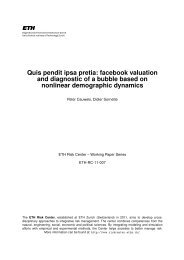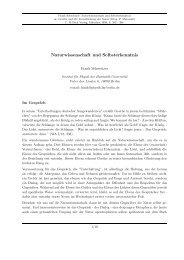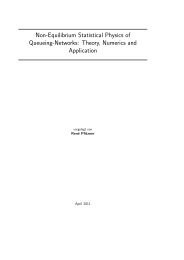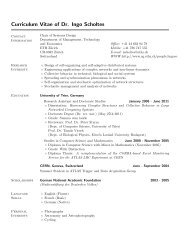Using Laboratory Experiments to Study Law and Crime - Chair of ...
Using Laboratory Experiments to Study Law and Crime - Chair of ...
Using Laboratory Experiments to Study Law and Crime - Chair of ...
Create successful ePaper yourself
Turn your PDF publications into a flip-book with our unique Google optimized e-Paper software.
elationship between type <strong>of</strong> violence <strong>and</strong> attitudes. They conducted field experiments in whichthey manipulated the type <strong>of</strong> violence <strong>and</strong> measured the response <strong>of</strong> potential employers. Theresearchers sent letters inquiring about employment <strong>to</strong> companies in the South <strong>and</strong> the North.Some <strong>of</strong> the letters included information about an honor-related violence <strong>and</strong> some describedinvolvement in a felony robbery. Whereas the felony letters were responded <strong>to</strong> in similar waysacross regions, the honor letters were responded <strong>to</strong> more positively <strong>and</strong> sympathetically in theSouth than in the North. The results <strong>of</strong> the field experiments were consistent with the those <strong>of</strong>the survey <strong>and</strong> legal analyses. They provide evidence that a concern with honor drives southernattitudes about violence.Finally, Cohen <strong>and</strong> his colleagues conducted a series <strong>of</strong> labora<strong>to</strong>ry experiments thatcompared how subjects from the South <strong>and</strong> the North reacted <strong>to</strong> insults in the labora<strong>to</strong>ry (Cohenet al. 1996). They argued that if Southerners’ approval <strong>of</strong> violence really is driven by a concernwith honor, then in comparison <strong>to</strong> Northerners, Southerners would view insults as damaging <strong>to</strong>their reputation, they would be more upset by the insult, <strong>and</strong> they would behave moreaggressively following the insult.In their first experiment, Cohen <strong>and</strong> his colleagues brought students from the South <strong>and</strong>2the North in<strong>to</strong> the experimental labora<strong>to</strong>ry at the University <strong>of</strong> Michigan. There were twoconditions – one in which a confederate <strong>of</strong> the experimenter bumped in<strong>to</strong> the subject <strong>and</strong> calledhim an asshole, <strong>and</strong> one in which no insult occurred. Two other confederates observed howsubjects reacted <strong>to</strong> the insult. Subjects then read a vignette about a man (Larry) <strong>and</strong> woman (Jill)at a party. Twenty minutes after arriving at the party, Jill <strong>to</strong>ld Larry about a man who wasmaking passes at her. A few minutes later, Larry saw the man try <strong>to</strong> kiss Jill. Subjects wereasked <strong>to</strong> finish the s<strong>to</strong>ry.The results showed that Northerners were more likely <strong>to</strong> be amused by the insult <strong>and</strong>Southerners were more likely <strong>to</strong> get angry. There was a statistically significant interactionbetween region (south versus north) <strong>and</strong> insult (insult versus no insult) such that Southernerswho were insulted became more angry than subjects in the other conditions. Further, 75% <strong>of</strong>12







